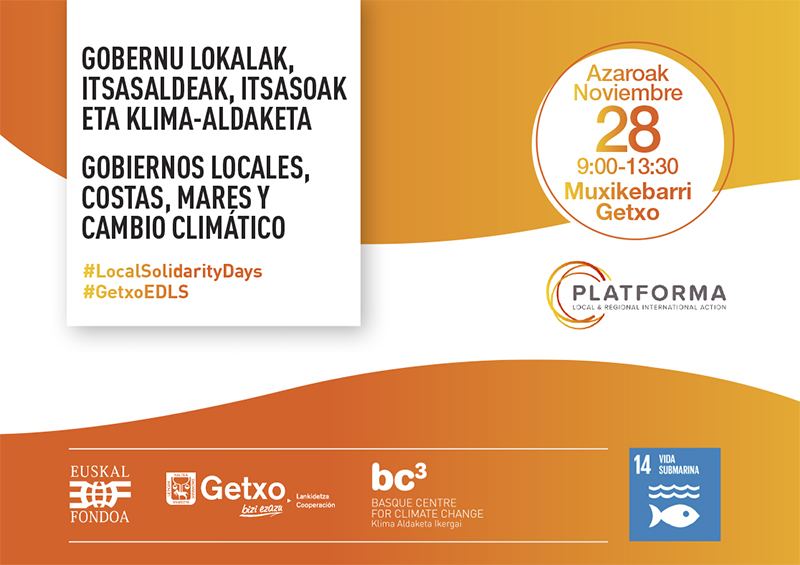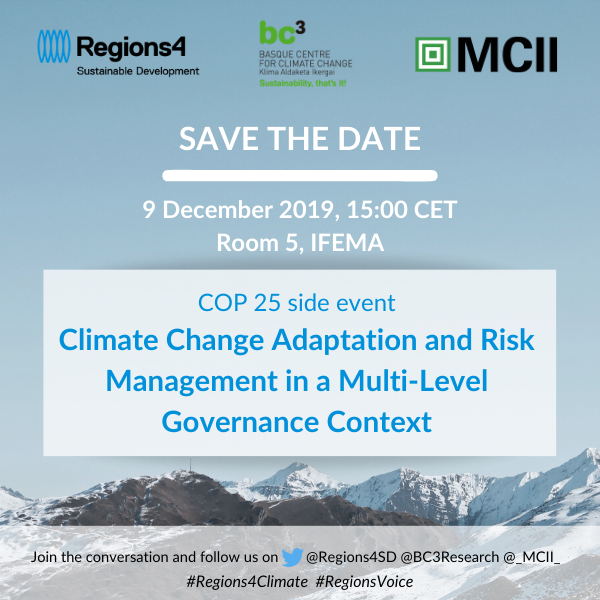BC3
BC3-EHU/UPV Summer School 2019: Transformation, Adaptation and Mitigation for a 1.5 degree Global Warming
BC3-Basque Centre for Climate Change Sede Building 1, 1st floor, Scientific Park of the University of the Basque Country,Leioa,Bizkaia,SpainThis year we run the 10th edition of the BC3-UPV/EHU Summer School on Climate Change that started in July 2010, when the international community was in the search of a successor agreement to the Kyoto Protocol, following a non-binding Copenhagen Accord put forth in 2009. Since then, the Summer School has covered a wide range of topics from an interdisciplinary perspective and has closely followed the international negotiations on climate change. Two years ago, the Summer School focused on the factors behind the paradigm shift in international policymaking, which eventually led to the Paris Agreement. Then, the US government’s decision to back out the agreement led to a “climate of uncertainty” that constituted the main topic discussed in last year’s edition.
Emergencia climática: ¿qué puedo hacer? | Larrialdi Klimatikoa: Zer egin dezaket?
Mikel Laboa Plaza UPV/EHU Bizkaiko Campusa,Leioa,BizkaiaBC3 – Basque Centre for Climate Change: Klima Aldaketa Ikergai, crea una iniciativa para informar a los estudiantes de la UPV/EHU sobre el cambio climático y cuáles son sus consecuencias | BC3 - Basque Centre for Climate Change: Klima Aldaketa Ikergai zentroak ekimen berria jarri du martxan UPV/EHUko ikasleak klima aldaketaz eta honen ondorioen berri emateko.
ESP10 Word Conference – Aries Pre-Release
Leibniz Universität Hannover (LUH) nstitute of Physical Geography and Landscape Ecology, Schneiderberg Str. 50 30167,Hannover,GermanyThe training session ARIES (Artificial Intelligence for Ecosystem Services) will illustrate how the ARIES modelling framework implements integration and interoperability approaches through semantic web modelling and how this approach can overcome some of the common challenges of data and model integration, providing a broad range of collaborative models from simple to complex, while efficiently reusing scientific and stakeholder knowledge and sharing it with the larger ecosystem services community.Alivedemowill show how its web interface k.Explorerworks.
IPBES 2nd author meeting for the values assessment
Vitoria-GasteizInternational specialists in biodiversity and ecosystems will meet next week in Vitoria-Gasteiz to address the multiple values and benefits offered by nature, its ecosystems and its biological diversity. This is the panel of experts of IPBES, Intergovernmental Science-Policy Platform on Biodiversity and Ecosystem Services, an independent intergovernmental body sponsored by the United Nations.
HAUSNARKARIAK ETA KLIMA ALDAKETA: Aingeru edo deabruak?
BC3-Basque Centre for Climate Change Sede Building 1, 1st floor, Scientific Park of the University of the Basque Country,Leioa,Bizkaia,SpainKlima aldaketari aurre egiteko behi okela jatea utzi behar dugu? Hausnarkarien inpaktuak Ingurumenean nola neurtzen dira? Informazioa nola zabaltzen dugu? Eta nola interpretatzen da?
Urriaren 28an, BC3n galdera hauen inguruan arituko gara Pablo Manzano (Helsinki Unibertsitatea), Agustin del Prado (BC3) eta ikerketa zentroko beste ikertzaile batzuekin.
Jardunaldiaren helburua, era pausatu batean, behi okelaren kontsumoaren inguruan sortu diren polemika desberdinen inguruan haritzea da eta honek ingurumenean duen inpaktuaz.
100xCiencia.4 Tendiendo puentes entre ciencia y sociedad
Tabakalera San Sebastian,Gipuzkoa,Spain100xCiencia.4 cubrirá temas como la transferencia de tecnología, y cómo ésta y la investigación de la cual bebe, se traduce en beneficios para la sociedad. Este año 100xCiencia pondrá el acento en la importancia de la I+D+i, y cómo ello genera un retorno tangible para la ciudadanía a la vez que se traduce en la generación de productos y servicios que mejoran el bienestar y la calidad de vida del público. Al mismo tiempo, en el evento las instituciones de SOMMa tendrán ocasión de mostrar sus proyectos a la ciudadanía.
“Gobernu lokalak, itsasaldeak, itsasoak eta klima-aldaketa”
Getxo Getxo,Bizkaia,SpainEl próximo 28 de noviembre tendrá lugar en Getxo la jornada “Gobiernos locales, costas, mares y cambio climático”, que organizamos junto con Euskal Fondoa y el Ayuntamiento de Getxo, con el objetivo de dar a conocer qué se está haciendo desde Euskadi para conservar los ecosistemas marítimos y costeros, tanto desde la Ciencia como desde las Administraciones públicas locales o la Cooperación. Contaremos para ello con expertas y expertos de BC3, el centro tecnológico AZTI, la ONG Medicus Mundi, o el propio Ayuntamiento de Getxo.
COP25: “The role of ruminants on climate change mitigation: the good and the bad”
Spanish PavilionThe objective of the event panel is to discuss about the role of ruminants livestock systems on delivering low-carbon pathways, taking into account the different world contexts. This panel will bring together and discuss different new scientific/technical information to enhance the societal understanding of the real challenges and opportunities that grass-fed livestock systems (ruminants) have in the face of climate change mitigation. Participants will have an opportunity to also gather new evidence that updates current GHG estimates for ruminants (based on IPCC methodologies), explores new GHG reference baselines and the link of different emissions pathways with future global warming, while disscusion on how society percives the issue of livestock contribution to climate change through the eyes of an enviroemental journalist.
Climate Change Adaptation and Risk Management in a Multi-Level Governance Context
Room5 , IFEMA, COP25 VenueIn the framework of the COP25, this side event will discuss the topics of climate change adaptation and disaster risk financing as a multi-level governance challenge. Organised by Regions4 Sustainable Development, in collaboration with the Basque Centre for Climate Change (BC3) and the Munich Climate Insurance Initiative (MCII), it will highlight good practices and experiences from different levels of government. It will further reveal common challenges and provide recommendations for policymakers that could guide the development and implementation of national, regional and local adaptation plans and strategies.
Planetary Health: A Balance between the Welfare of the Planet and that of Human Beings
ISGlobal will be present at the United Nations Climate Change Conference (COP 25), in Madrid, from December 2 to 13, and will organise the parallel event "Planetary health: A balance between the welfare of the planet and that of humans".











